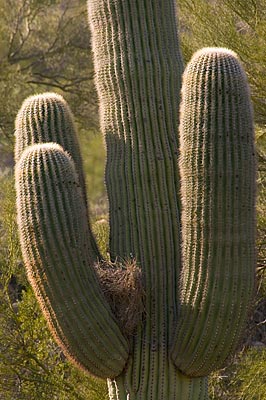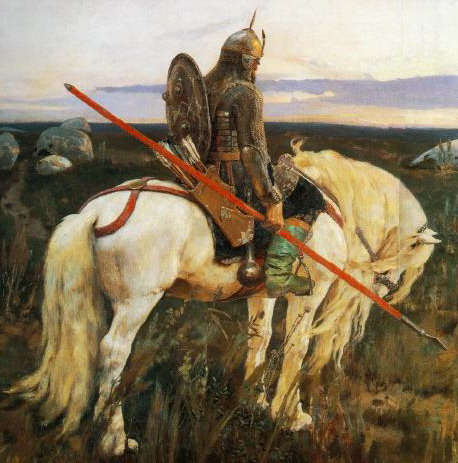
SAGUARO & TUMBLEWEED
PRODUCTIONS

present the song
Eldorado
*
| Didn't you always think
that Poe's fabulous ballad "Eldorado" was crying out to be transformed
into a song?
Anyway, I did, and that is why I wrote and recorded the song, hoping to capture the atmosphere evoked in the poem... |
|
Lyrics by |
|
|
|
3. And, as his strength Failed him at length, He met a pilgrim shadow "Shadow," said he, "Where can it be This land of Eldorado?" 4. "Over the Mountains Of the Moon, Down the Valley of the Shadow, Ride, boldly ride," The shade replied "If you seek for Eldorado!" |
| Note: gaily bedight = dressed in bright colours | |
|
|
|
*
Vocals, guitars:
Bernd Wahlbrinck
galloping horse:
Alan Bourdillion Traherne
Recorded on July 7, 2007 at the
Saguaro & Tumbleweed Studios
Home of the Wadel
Germany
*
*
Miscellany
What follows are
Interesting bits & pieces
concerning the poem and the song
*

|
This is the left part of the painting The Knight at the Crossroads by Viktor Vasnetsov. I have a feeling the knight depicted here comes close to the picture of the knight evoked in the poem ... (If you happen to know one that is closer, do let me know!) |
*
|
Guitar Chords These are the harmonies I used. |
|
Am
F C
G
D
Am Am
F C
G D (open)
Am |
*
| Here is a link to an attempt at a German translation of the poem. | |
| And here is my own feeble attempt at a translation into German... | |
|
Gar schmuck so
ritt er
Doch er ward
alt
Und als trotz
Kraft
"Über des
Mondes |
1. Gaily bedight
2. But he grew old
3. And as his strength
"Over the Mountains |
*
|
BACKGROUND INFO based on Wikipedia |
|
The poem describes the journey of a "gallant knight" in search of the legendary El Dorado. The knight spends much of his life on this quest. In his old age, he finally meets a "pilgrim shadow" who points the way through "the Valley of Shadow." The poem is made up of four six-line stanzas. Poe uses the term shadow in the middle of each stanza. The meaning of the word, however, changes with each use. First, it is a literal shadow, where the sun is blocked out. In the second, it implies gloom or despair. The third use is a ghost. The final use, "the Valley of Shadow," can be replaced with "Valley of Death," possibly suggesting that Eldorado (or riches in general) does not exist in the living world. The time of the poem's publication, 1849, was during the California gold rush and may have been Poe's reaction to that event. |
*
|
HOWARD HAWKS: |
|
In
the remarkable 1966
movie El Dorado,
directed by Howard Hawks, Edgar Allan Poe's poem Eldorado is
featured in the music of the film, it
is quoted by James Caan's character,
Mississippi, and it
provides the basic theme of the
story.
It also turns out to be a running gag delivered in a very humorous way by James Caan - though the John Wayne character (Cole Thornton) does not seem to like it... * Mississippi: Always liked that poem too. Makes me wanna... Cole: Ride, boldly ride? Well it don't work out that way. Mississippi:
I'm learnin' that. |
|
Add'l info: "Eldorado" has four verses. James Caan recites three, omitting the second. He recites the first verse and part of the fourth riding with Wayne after they meet for the first time, the third when Wayne is about to ride out for the final gunfight, and the complete fourth when he himself takes up the second wagon's reins. |
| Here are the lyrics of the title music. |
|
|
*
|
Werner Herzog: |
|
The futile idea of looking for El Dorado is brilliantly depicted in Werner Herzog's film Aguirre the Wrath of God (Aguirre oder der Zorn Gottes), based loosely on the historical figure of the Spanish conquistador Lope de Aguirre. |
*
|
Random Bits & Pieces |
|
*
|
Allusions in Eldorado: The Mountains of the Moon |
|
|
In
Poe Studies,
vol. X, no. 2, December 1977,
there is an interesting interpretation of The Mountains of the Moon: A … source for Poe's allusion … may be found in Charles Anthon's Classical Dictionary, a work Poe knew well, borrowed from, praised, and defended. … Under the long and detailed entry for "Nilus," Anthon notes that Ptolemy fixes the source of one branch of the Nile "in numerous lakes at the foot of the Mountains of the Moon," and that the river, "as if it were doomed for ever to share the obscurity which covers the ancient history of the land to which it ministers, still conceals its true sources from the eager curiosity of modern science. ... The repeated failures which had already attended the various attempts to discover its fountains, convinced the geographers of Greece and Rome that success was impossible, and that it was the will of the gods to conceal from all generations this great secret of nature". Given Poe's probable knowledge of this source, it seems likely that the poem's allusion to the Mountains of the Moon, in keeping with that to Eldorado, functions ironically to call up an image of the impossible quest, in this case, the search for the source of the Nile. Reinforcing this interpretation is the existence of a proverb using this search to signify impossibility: in the words of the entry "Nilus" in J. Lempriere's Classical Dictionary, on which Anthon's work of the same name is based, the river's "sources were unknown to the ancients, and the moderns are equally ignorant of their exact situation, whence an impossibility is generally expressed by the proverb of Nili caput quaere [to seek the source of the Nile]". |
|
|
|
|
|
Al-Idrisi map of 1533. Please note that on early Arabic maps of this type, South was placed at the top of the map. As a help the map on the right has therefore been turned upside down. In the map on the right the Mountains of the Moon are in the 7 or 8 o'clock position; of course, they appear upside down. The lakes at the foot of the mountains and the Nile are clearly visible. |
|
*
|
Poe's poem ELDORADO: Links to other paintings |
*
Contact: Bernd Wahlbrinck